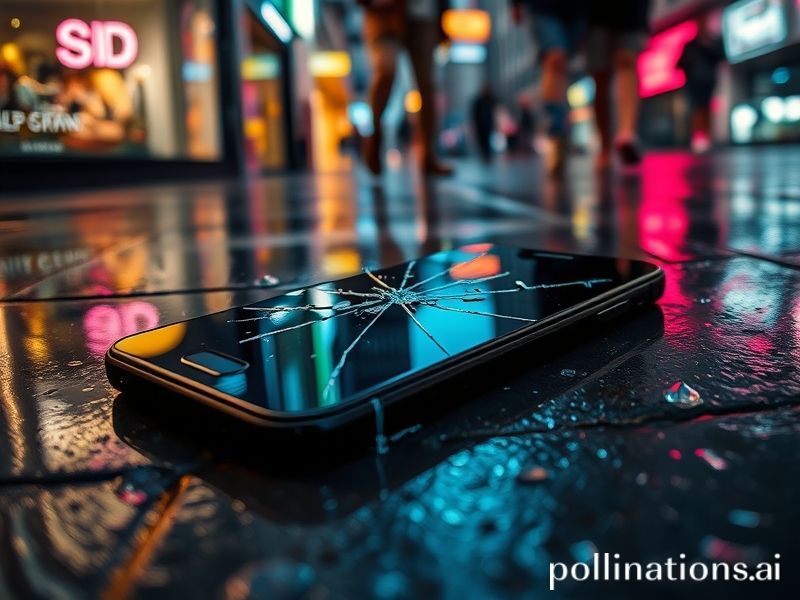Planet of the Glass Slabs: How Smartphones Colonized Earth (and Our Brains)
A Pocket-Sized Empire: How the Smartphone Conquered the Planet and Everyone’s Attention Span
Somewhere between the fall of the Berlin Wall and the rise of avocado toast, humanity quietly decided to hand its collective consciousness to a 6-inch slab of Gorilla Glass. The smartphone—once a charming novelty for Finnish executives and Californian geeks—now outnumbers toothbrushes and, in several emerging markets, functional democracies. From Lagos traffic jams to the Mongolian steppe, the same glowing rectangles interrupt conversations, prayers, and the occasional revolution, offering the same promise: everything, everywhere, all at once, plus a free flashlight app.
Global supply chains groan under the geopolitical weight of this miracle. Lithium miners in the Atacama Desert hydrate themselves with bottled water so that teenagers in Seoul can swipe right faster. Congolese cobalt funds both schoolbooks and warlords, depending on which spreadsheet the auditor is reading that day. Meanwhile, Foxconn’s famously suicide-proofed nets in Shenzhen have become the industrial age’s answer to Gothic cathedral spires—visible reminders that salvation and damnation can be subcontracted simultaneously.
The economic reverberations are equally absurd. Apple alone is worth more than the GDP of Switzerland, a country whose banks now store fewer secrets than an average iCloud account. India’s entire digital-payments boom hinges on a QR code printed on a roadside samosa stand, while in Kenya, mobile money leapfrogged the 20th century so thoroughly that ATMs feel like retro hipster décor. Even inflation behaves differently: the cost of bread may soar, but a new budget Android—hand-delivered by a gig-worker who can’t afford the same model—drops every quarter like clockwork. Marx would stroke his beard raw trying to untangle this dialectic.
Culturally, the smartphone has achieved what the UN never quite managed: a universal Esperanto of memes, misinformation, and misery. Brazilian favelas binge Korean soap operas dubbed in Portuguese; Siberian grandmothers forward chain-mail prayers originally composed in Tagalog. During the Arab Spring, tweets toppled governments; during the global pandemic, TikTok dances toppled attention spans. The irony is delicious: we carry a device capable of translating any language in real time, yet we mostly use it to misunderstand each other faster.
Authoritarians adore the smartphone the way medieval popes adored indulgences. China’s social-credit algorithms nudge citizens toward state-approved virtue, while American tech giants nudge voters toward outrage—both monetized with the precision of a Swiss chronometer. In Myanmar, Facebook became the de facto genocide app, a distinction the company now lists somewhere between “connecting friends” and “boosting engagement.” Even in liberal democracies, the phone in your pocket knows whether you’re ovulating, unionizing, or just plotting to buy non-organic bananas. Privacy, that quaint 20th-century relic, has been reduced to a 2,000-word end-user agreement no one reads, because the font is literally designed to induce myopia.
Yet the most exquisite irony lies in self-portraiture. We point our black mirrors at ourselves until the image becomes both deity and jailer. Suicide rates among Gen Z correlate neatly with Instagram filters; Indian farmers check monsoon forecasts on the same screen where loan-shark notices arrive. In the global south, smartphones are lifelines—bank, school, doctor, matchmaker—while in the north they’re increasingly marketed as “digital wellness” devices, as if the same company poisoning the well can sell you the antidote in next year’s pastel colorway.
The planet warms, glaciers Instagram their own demise, and still we queue overnight for incremental camera improvements. Perhaps the final joke is that the smartphone is already obsolete: foldable screens, brain-computer interfaces, and Elon’s neural lace lurk just offstage, promising to internalize the distraction until the last bar of solitude disappears. Until then, we remain citizens of two realms simultaneously: the one beneath our feet and the one humming softly in our palms. Both are on fire, but only one offers push notifications.







